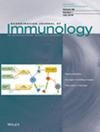Systematic analysis of mucosal‐associated invariant T cells in haematological malignancies
IF 4.1
4区 医学
Q2 IMMUNOLOGY
引用次数: 0
Abstract
Mucosal‐associated invariant T‐cells (MAIT) are unconventional T‐cells with cytotoxic and pro‐inflammatory properties. Previous research has reported contradictory findings on their role in cancerogenesis with data being even scarcer in haematological malignancies. Here, we report the results of a systematic analysis of MAIT cells in treatment‐naïve patients with a broad range of haematological malignancies. We analysed peripheral blood of 204 patients and 50 healthy subjects. The pool of haematological patients had a statistically significant lower both the absolute value (median values, 0.01 × 10

对血液恶性肿瘤中粘膜相关不变 T 细胞的系统分析
粘膜相关不变 T 细胞(MAIT)是一种非常规 T 细胞,具有细胞毒性和促炎特性。以往的研究对它们在癌症发生过程中的作用报道不一,而血液恶性肿瘤方面的数据更是少之又少。在此,我们报告了对各种血液恶性肿瘤的治疗无效患者体内 MAIT 细胞进行系统分析的结果。我们分析了 204 名患者和 50 名健康人的外周血。与对照组相比,血液病患者库中 MAIT 细胞的绝对值(中位值为 0.01 × 109/L 对 0.05 × 109/L)及其在 T 细胞中所占的百分比(中位值为 0.94% 对 2.56%)均明显降低。单独分析表明,与对照组相比,急性髓性白血病、骨髓增生性肿瘤、浆细胞骨髓瘤、B 细胞非霍奇金淋巴瘤(未列明)、弥漫大 B 细胞淋巴瘤、滤泡淋巴瘤、套细胞淋巴瘤、边缘区淋巴瘤患者 MAIT 细胞绝对数量明显减少。此外,在血液恶性肿瘤中,MAIT 细胞过度表达 PD-1(平均值 51.7% 对 6.7%)、HLA-DR(平均值 40.2% 对 7%)、CD38(平均值 25.9% 对 4.9%)和 CD69(平均值 40.2% 对 9.2%)。将个别恶性肿瘤患者与对照组人群进行比较也得到了类似的结果。我们的数据显示,循环中的 MAIT 细胞减少是多种血液恶性肿瘤中的常见现象。MAIT 细胞除了数量减少外,还出现了活化/耗竭表型。
本文章由计算机程序翻译,如有差异,请以英文原文为准。
求助全文
约1分钟内获得全文
求助全文
来源期刊
CiteScore
7.70
自引率
5.40%
发文量
109
审稿时长
1 months
期刊介绍:
This peer-reviewed international journal publishes original articles and reviews on all aspects of basic, translational and clinical immunology. The journal aims to provide high quality service to authors, and high quality articles for readers.
The journal accepts for publication material from investigators all over the world, which makes a significant contribution to basic, translational and clinical immunology.

 求助内容:
求助内容: 应助结果提醒方式:
应助结果提醒方式:


